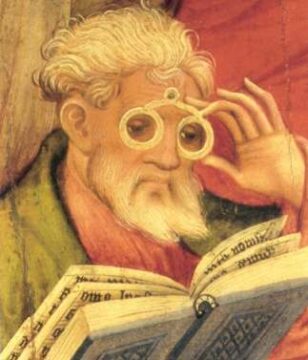by Ed Simon
 As an émigré from the dusty, sun-scorched Carthaginian provinces, there are innumerable sites and experiences in Milan that could have impressed themselves upon the young Augustine – the regal marble columned facade of the Colone di San Lorenzo or the handsome red-brick of the Basilica of San Simpliciano – yet in Confessions, the fourth-century theologian makes much of an unlikely moment in which he witnesses his mentor Ambrose reading silently, without moving his lips. Author of Confessions and City of God, father of the doctrines of predestination and original sin, and arguably the second most important figure in Latin Christianity after Christ himself, Augustine nonetheless was flummoxed by what was apparently an impressive act. “When Ambrose read, his eyes ran over the columns of writing and his heart searched out for meaning, but his voice and his tongue were at rest,” remembered Augustine. “I have seen him reading silently, never in fact otherwise.”
As an émigré from the dusty, sun-scorched Carthaginian provinces, there are innumerable sites and experiences in Milan that could have impressed themselves upon the young Augustine – the regal marble columned facade of the Colone di San Lorenzo or the handsome red-brick of the Basilica of San Simpliciano – yet in Confessions, the fourth-century theologian makes much of an unlikely moment in which he witnesses his mentor Ambrose reading silently, without moving his lips. Author of Confessions and City of God, father of the doctrines of predestination and original sin, and arguably the second most important figure in Latin Christianity after Christ himself, Augustine nonetheless was flummoxed by what was apparently an impressive act. “When Ambrose read, his eyes ran over the columns of writing and his heart searched out for meaning, but his voice and his tongue were at rest,” remembered Augustine. “I have seen him reading silently, never in fact otherwise.”
Such surprise, such wonderment would suggest that something as prosaic as being able to read silently, free of whispering lips and finger following the line, was a remarkable feat in fourth-century Rome, so much so that Augustine sees fit to devote an entire paragraph to his astonishment. Both men were exemplary theologians, Church Fathers, and eventually saints, but only Ambrose was able to accomplish this simple task which you’re most likely doing right now. For Ambrose – as for you and me and billions of other literate people the world over – literacy allows for a cordoned off portion of the self, a still mind as if an enclosed garden from which words may be privately considered, debated, ,or enjoyed, while for Augustine, by contrast, all of those millions of arguments he constructed could only be uttered aloud by their author, and by the vast majority of his readers. Read more »

 I’m haunted by the enormity of all of that which I’ll never read. This need not be a fear related to those things that nobody can ever read, the missing works of Aeschylus and Euripides, the lost poems of Homer; or, those works that were to have been written but which the author neglected to pen, such as Milton’s Arthurian epic. Nor am I even really referring to those titles which I’m expected to have read, but which I doubt I’ll ever get around to flipping through (In Search of Lost Time, Anna Karenina, etc.), and to which my lack of guilt induces more guilt than it does the real thing. No, my anxiety is born from the physical, material, fleshy, thingness of the actual books on my shelves, and my night-stand, and stacked up on the floor of my car’s backseat or wedged next to Trader Joe’s bags and empty pop bottles in my trunk. Like any irredeemable bibliophile, my house is filled with more books than I could ever credibly hope to read before I die (even assuming a relatively long life, which I’m not).
I’m haunted by the enormity of all of that which I’ll never read. This need not be a fear related to those things that nobody can ever read, the missing works of Aeschylus and Euripides, the lost poems of Homer; or, those works that were to have been written but which the author neglected to pen, such as Milton’s Arthurian epic. Nor am I even really referring to those titles which I’m expected to have read, but which I doubt I’ll ever get around to flipping through (In Search of Lost Time, Anna Karenina, etc.), and to which my lack of guilt induces more guilt than it does the real thing. No, my anxiety is born from the physical, material, fleshy, thingness of the actual books on my shelves, and my night-stand, and stacked up on the floor of my car’s backseat or wedged next to Trader Joe’s bags and empty pop bottles in my trunk. Like any irredeemable bibliophile, my house is filled with more books than I could ever credibly hope to read before I die (even assuming a relatively long life, which I’m not). About a third of the way through a first-year humanities honors course, one of my more engaged and talkative students pulled me aside after class for a private chat. She waited, clearly anxious, while the rest of her classmates filed out and then turned to me with her eyes already filling up with tears.
About a third of the way through a first-year humanities honors course, one of my more engaged and talkative students pulled me aside after class for a private chat. She waited, clearly anxious, while the rest of her classmates filed out and then turned to me with her eyes already filling up with tears.